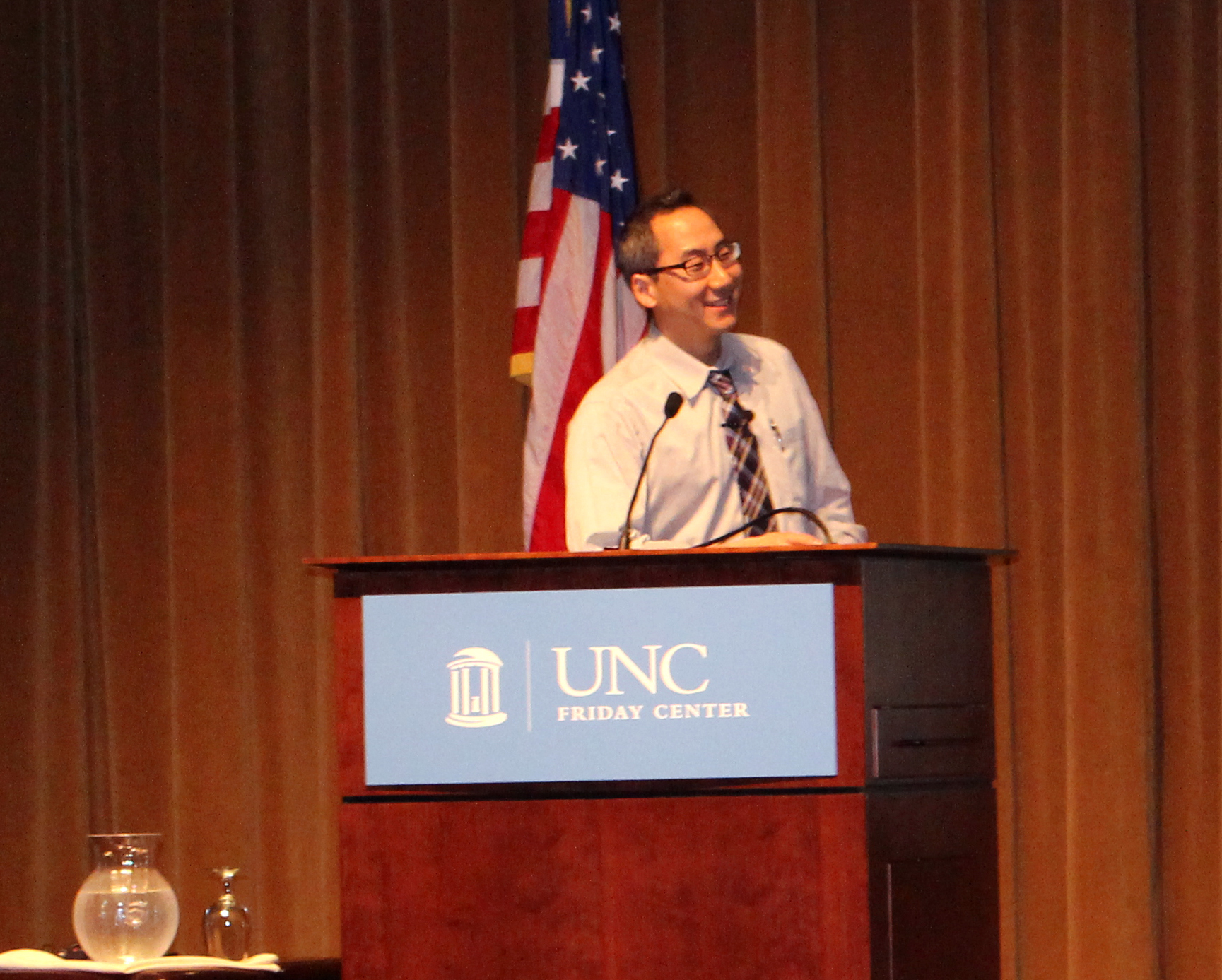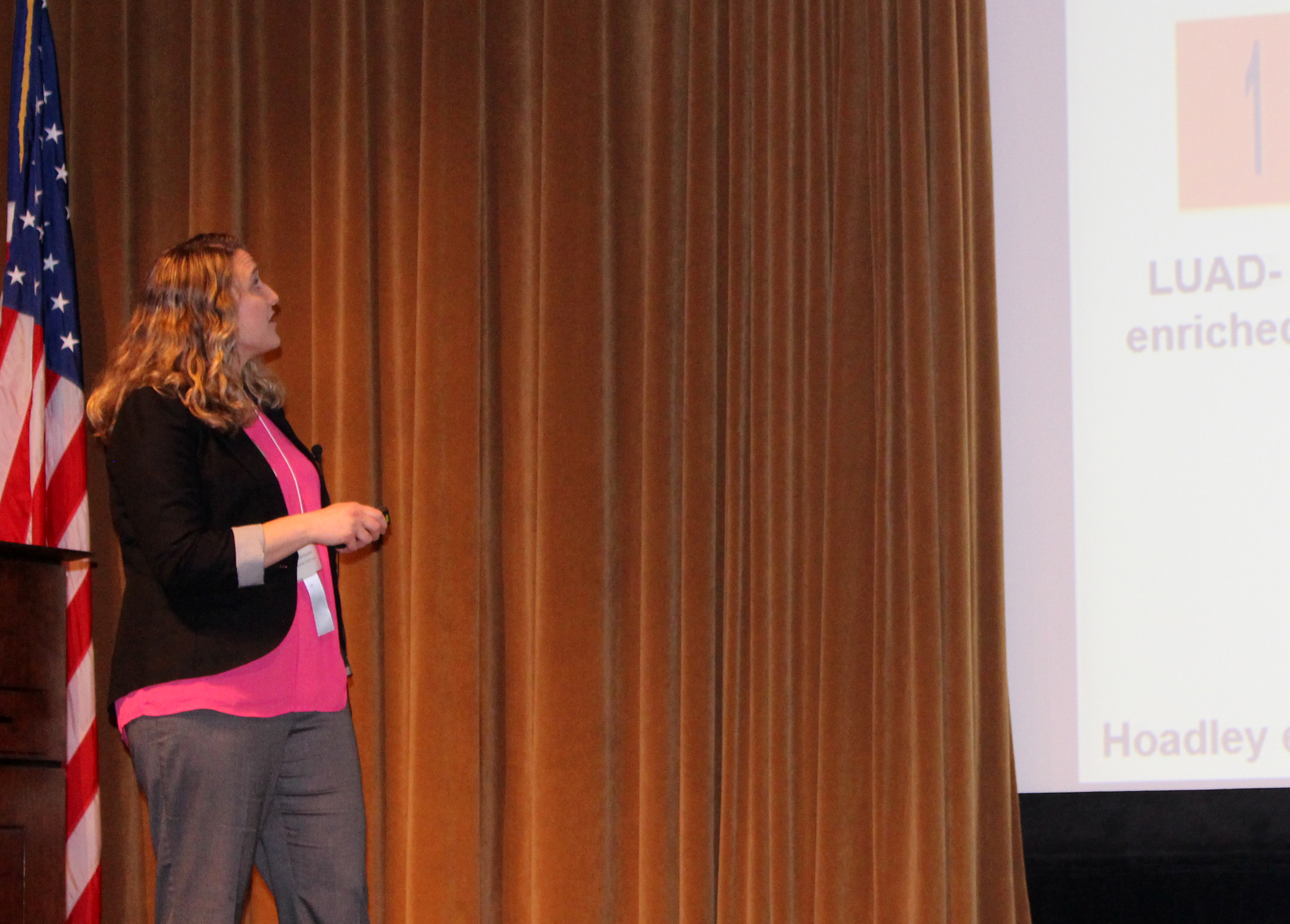UNC Lineberger’s 39th annual scientific symposium was held April 8-9 at the William and Ida Friday Center for Continuing Education in Chapel Hill.


Researchers working to uncover the genetic causes of cancer convened at UNC Lineberger Comprehensive Cancer Center’s 39th annual symposium April 8-9, sharing strides made to translate those findings into the clinic.
More than 400 people attended the 39th annual event held April 8-9 at the William and Ida Friday Center for Continuing Education in Chapel Hill. Researchers from institutions around the country and from the United Kingdom presented findings of genomic abnormalities in a variety of cancers including acute myeloid leukemia, breast cancer, kidney cancer, bladder cancer, melanoma, lymphoma and lung cancer.
Co-organizer Charles M. Perou, PhD, a UNC Lineberger member and professor of genetics, pathology and laboratory medicine at the UNC School of Medicine, argued that we now know the genetic cause of a particularly aggressive form of breast cancer known as triple negative breast cancer. Triple negative breast cancer would be tied for fifth in deaths of U.S. women per year if it were its own disease, Perou said. A national effort to characterize the molecular alterations in cancer known as The Cancer Genome Atlas project found that for the basal-like breast cancer subtype, there is a surprisingly short list of significantly mutated genes, but a high rate of mutations in the TP53 gene, he said.
“I’ll argue that we know the genetic causes of triple negative cancer,” Perou said. However, even with this knowledge in hand, “there’s still a great need to come up with therapies for the triple negative type of breast cancer.”
A number of the symposium speakers are actively involved in The Cancer Genome Atlas project (TCGA), which is a joint effort of the National Cancer Institute and National Human Genome Research Institute. Research institutions, including UNC, worked collaboratively as part of the project to map out the molecular characteristics of about 30 cancer types.
“(We) have generated this astounding resource, really, for cancer genomics, genetics, and now our challenge is to translate this into changes and improvements in clinical care,” Perou said of the results of TCGA so far. While he said the production side of the effort is largely finished, the analysis of the data generated from it is ongoing.
Elaine Mardis, PhD, a professor at The Genome Institute at the Washington University School of Medicine, described findings of a TCGA study that sought to characterize the molecular changes in 200 acute myeloid leukemia samples. They found that average number of mutated genes in any one sample was less than 15, she said.
Mardis described efforts to translate genomic findings into the clinic. She said the goal is to compare mutations in samples taken at diagnosis to mutations in samples 30 days after chemotherapy in order to be able to better predict which patients might relapse or who should be treated with additional therapies.
In addition, she described a research effort to use genomics to help identify mutations in order to develop a vaccine for advanced melanoma.
“(The translation) of cancer genomics – especially coming out of these large-scale studies like TCGA – is really under way,” she said.
William Y. Kim, MD, a UNC Lineberger member and an associate professor at the UNC School of Medicine, spoke on UNC’s findings of molecular subtypes of bladder cancer. Kimryn Rathmell, MD, PhD, spoke on molecular characteristics of renal cell carcinoma, a kidney cancer. A major finding of one TCGA analysis was that different subtypes of renal cell carcinoma are “night and day very different cancers,” Rathmell said, based on their molecular characteristics. “Renal cell carcinomas are a group of highly distinct, unrelated diseases,” she said.
Co-organizer D. Neil Hayes, MD, MPH, a UNC Lineberger member and an associate professor of clinical research in hematology and oncology at the UNC School of Medicine, spoke about a clinical trial at UNC that uses DNA sequencing to identify potential molecular markers in a patient’s tumor. The idea is to use the results of those tests to provide an individualized treatment protocol that directly targets the genetic alterations.
Fifty-five percent of 770 enrolled patients who have seen results from the trial so far were recognized to have an actionable mutation, Hayes said. He described successes and challenges seen so far of the in translating those findings into clinical practice, including access issues to the drugs associated with the actionable treatment.
Gordon B. Mills, chair of the Department of Systems Biology at The University of Texas MD Anderson Cancer Center in Houston, also spoke on an investigational program at MD Anderson to sequence cancer patients’ tumors to find actionable treatments for them. Mills said that we can now characterize patients’ cancers in a “breadth and depth” not thought possible before.
Other symposium speakers included Laura van’t Veer, PhD, Breast Oncology Program leader and associate director of applied genomics at the UCSF Helen Diller Family Comprehensive Cancer Center; Matthew Ellis, MD, director of the Lester and Sue Smith Breast Center at Baylor College of Medicine; Jason Carroll of the Cambridge Research Institute; Stephen Chanock, MD, director of the National Cancer Institute Division of Cancer Epidemiology & Genetics; Jennifer Grandis, MD, the University of California San Francisco associate vice chancellor of clinical and translational research; Matt Wilkerson, PhD, a UNC Lineberger member and assistant professor in the UNC School of Medicine Department of Genetics; Max Wallace, CEO of Accelerate Brain Cancer Cure; Louis Staudt, MD, PhD, co-chief of the Lymphoid Malignancies Branch at the National Cancer Institute; Richard Gibbs, PhD, chair and professor of molecular and human genetics at the Baylor College of Medicine; Dmitry Gordenin, Ph.D., the head of the Mechanism of Genome Dynamics Group at the NIEHS, Josh Stuart, associate director of the UC Santa Cruz Center for Biomolecular Science & Engineering for Cancer and Stem Cell Genomics; and Matthew Meyerson, MD, PhD, professor of Pathology at the Harvard Medical School.
Support from the symposium was provided by the National Institutes of Environmental Health Sciences, Agilent Inc., Accelerate Brain Cancer Cure, Illumina, Foundation Medicine, Burroughs Wellcome Fund, Cell Signaling Technology, GeneCentric, New England BioLabs, and the Hamner Institute for Health Sciences.
